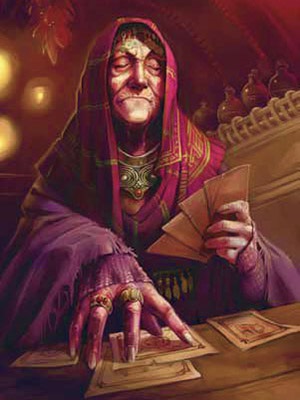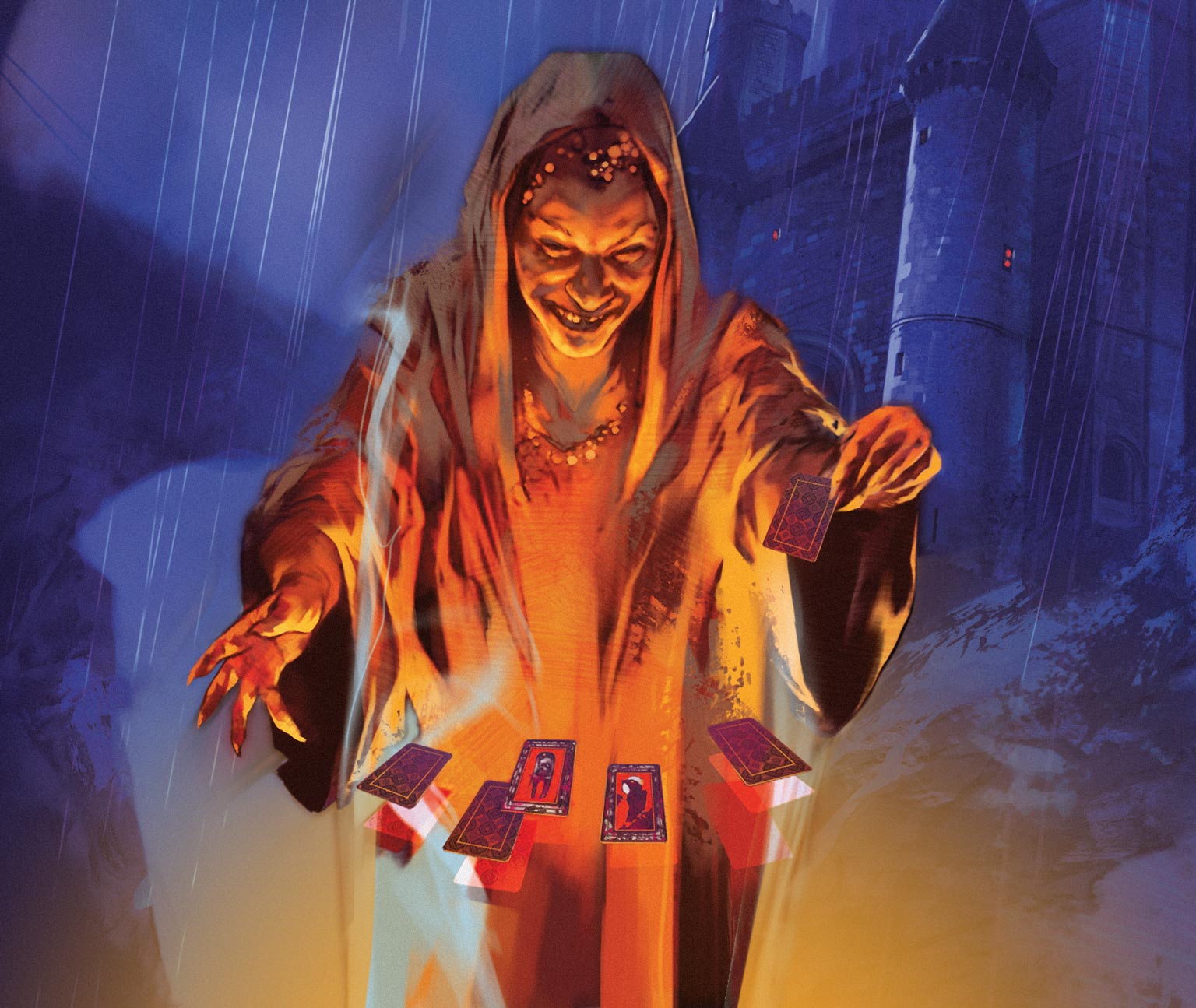Vistani
Ethnicity
Vistani are Fictional Gypsies
The Vistani are literally an interpretation of the real life Romani people, more popularly known as gypsies. "Gypsy" is technically not politically correct, either, but it's a euphemism that's so widespread people are more likely to recognize the name over "Romani." I'm not an expert on Romani culture, not by far, but here are few things I do know about them: Originating in southwest Asia, Romani are most typically known for their darker, cinnamon colored skin and their black hair. They often dress is fabrics of bright colors and intricate designs. The Romani people are historically nomadic and often moved around in large tribes made up of several families. Their people put a very heavy emphasis on clan unity. Sort of an insiders versus outsiders kind of mindset. Unfortunately, Romani got a pretty terrible reputation over time for being swindlers and cheats. This was an untrue stereotype that got a lot of Romani unjustly persecuted. One of the most popular examples of the Romani people comes from Disney's Hunchback of Notre Dame. Remember Esmeralda? She's a Romani. However, we did get a lot of fun things from the Romani people, whether wholly true or not. Fortune telling is often associated with their people, and we sure as heck see that in CoS.The Vistani are NOT all Strahd Spies
The book goes out of its way to tell us that just about all Vistani work for Strand. There are very few exceptions to this, namely Ezmerelda. This is a pretty sad thing to do with such an amazing people. After all, Strahd is pretty much synonymous with "Evil." He's the big bad guy in the campaign and by saying that all Vistani work for him, you're saying that the entire culture is evil too.The Real Relationship is Respect
Instead of being totally in cahoots, Strahd and the Vistani share a mutual respect of one another. The Vistani showed Strahd kindness and saved his life when they certainly didn't have to, impressing Strahd. Strahd made a vow that all Vistani would henceforth be welcome in his land, so long as they did not openly antagonize him. Because Strahd is a man of his word, he's honored his vow over the centuries. This gives the Vistani certain perks in Barovia: The Vistani are not attacked or targeted by the normal threats in Barovia, such as wolves and werewolves. The Vistani CAN NOT leave Barovia, just like everyone else. The book often implies that the Vistani can exert a certain level of control over the mists. In my version, this ability lies solely with Strahd himself. However, Strahd would never deny passage to a Vistana that asked to leave. All they need do is say the word and Strahd would open a gate for them through the mists, no questions asked. Strahd doesn't hunt for either blood or consorts among the Vistani. If a Vistana becomes a vampire spawn, it's because they pursued Strahd, not the other way around. However, this also means that the Vistani don't have any problem with Strahd either. Unless Strahd actively does something to hurt one of their own, the Vistani won't cross him. The PCs can beg and plead, but the Vistani will not act against someone who is not their enemy. Otherwise, the Vistani will treat Strahd with the same hospitality that they'd show anyone else. They freely give and take information, no matter who's asking for it. So long as the info isn't overtly harmful or incriminating, the Vistani believe that sharing and caring go hand in hand. ;)Vistani Culture
A Welcoming People In my game, the Vistani are the kings and queens of hospitality. If you are not their enemy, you are their friend, even if they just met you. The Vistani will treat visitors with open kindness, feeding them from their table and making sure they have beds for the night. The Vistani can also be quite loud and boisterous. They're fans of wine, music, and dance and often indulge in all three. They believe that these things are medicine for the human soul and push visitors to join them in their merrymaking. The more crest-fallen the PC, the more the Vistani will gather around them and push wine into their bellies and try to make them laugh.Beliefs/Religion
The Vistani worship Rema, God of Fates, or, the Threads of Fate. They believe that all actions have reactions and that fate's wound its strings around everyone. Rema, God of Fates (the Vistani word for Karma, essentially) is one of the core tenants of Vistani faith. They believe that kindness breeds kindness and hate breeds hate. If you are kind to them, they are kind back. If you hurt them, they will hurt you back. Simple, really. Here are a couple fun terms used among the Vistani. Some of these are canonical, others I edited or made up for my own lore:- Giorgio - Someone who is not Vistani. A general term for outsiders.
- Giogoto - An outsider who has done something so profound, they're basically honorary Vistani. They're accepted as one of the Vistani, though they weren't born one.
- Shae - a generic term for an honored elder.
- Raunie - A Vistana with an exceptional gift for seeing the Threads of Fate.
Travelers
The Vistani are nomadic in general. They always have a plethora of horses and barrel-top wagons at the ready, and can pitch tents like it's nothing. Throughout the campaign, you might want to throw in that the players spot a few Vistani wagons on the move on the road. Or if they're in the woods and need a break, they come across a small encampment. That being said, the two main camps mentioned in the book, the one at Tser Pool and the one south of Vallaki, are always present. The two locations are sort of like Vistani hubs, where different traveling families are in constant rotation. The families that the players meet the first time they stay at Tser pool won't likely be the same ones staying there a couple weeks later. Arrigal and Luvash are permanent installments south of Vallaki, however. Other families may come and go from that location, but the brothers stay as the local leaders and act as liaisons between them, Vallaki and the Dusk Elves. Madam Eva stays permanently at Tser Pool, but not for the same reason. She's so old that travel is pretty hard on her, so she's stays put. Because she's been around so long, most Vistani make it a point to visit Eva at least once in their lifetime, sort of like a pilgrimage.Storytelling
The Vistani are excellent storytellers. They collect tales of all kinds and share them almost every night around their campfires. When visitors come by their camp, they pretty much demand a story as payment for their hospitality. If a visitor is obviously too uncomfortable for this though, they don't push the issue and instead tell one of their own. Time in a Vistani camp should never feel tense or awkward.Family Units
The Vistani believe that family comes first and foremost. And to them, family isn't just the people you're related to by blood. Family is all the people around you, from extended family to friends and their families. Your BFF's mother is your mother too in Vistani culture.When a Vistana leaves their Tribe (Remanio)
If a Vistana decides to leave their tribe to say, go live in Vallaki, this isn't shunned. A Vistana is free to go live their lives away from their people if they choose. They won't become outcasts or hated by Vistani if they do so. Instead, when a Vistana decides to leave the tribe, the Vistani treat it like a death. They actively mourn the loss of the Vistana and send prayers to the fates for their safety away from their family. This ceremonial mourning is almost identical to a funeral in Vistani culture. The Vistani refer to someone who has voluntarily left the tribe as a Remanio, one who has been cut off from the Threads of Fate. Ezmerelda d'Avenir is a Remanio.When A Vistana returns to their Tribe (Vani)
If a Remanio is returned to the Vistani, they are welcomed with open arms and usually copious amounts of tears and hugging. This can happen if a Remanio decides they've made a mistake in leaving, or if they've accomplished their goal and are ready to come home. There's also a chance that a Vistana might get separated from the tribe by some happenstance or another. In my campaign, my Rogue is half-Vistani and doesn't know it. He grew up far away from the Vistani and is technically a Remanio. When someone is returned to the Vistani, they are called Vani. Vani is a term loosely meaning, "someone brought back from death."Outcasts and Enemies
Boy oh boy, you don't want to be an enemy of the Vistani. The Vistani don't necessarily hunt down their foes in a bloodlust or anything, but if you've done wrong to a Vistani, the whole people will know it. There is literally no redemption among the Vistani. If you're their enemy, you're their enemy forever. There's nothing you can do to get back into their good graces. Vistani never forgive and never forget.Mortu
Mortu is a term for an outcasted Vistana. This is someone who was born Vistani, but did something so awful that they were cast out. A Mortu looses all their Vistani powers, like the Evil Eye and their ability to curse others. If possible, before being exiled, a Mortu receives a small cut under their left eye that will leave a scar. This scar marks them forever as Mortu.Mortio
Mortio is a term for an enemy of the Vistani. A Mortio is an outsider that did some harm to the Vistani and became their enemy. If a Vistana comes across a known Mortio, they will actively try to curse them before chasing them away.Sources:
https://www.reddit.com/r/CurseofStrahd/comments/8ymg7y/fleshing_out_curse_of_strahd_tser_pool_the/










Comments